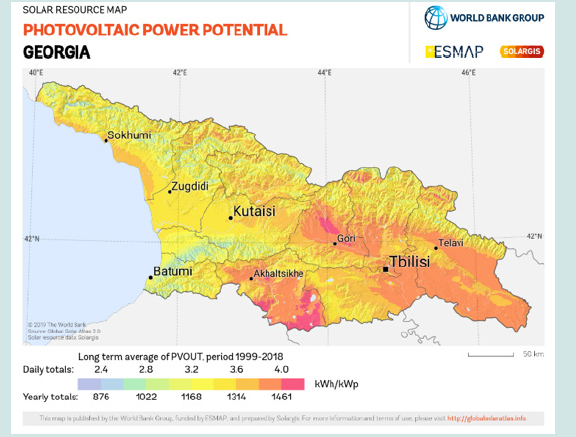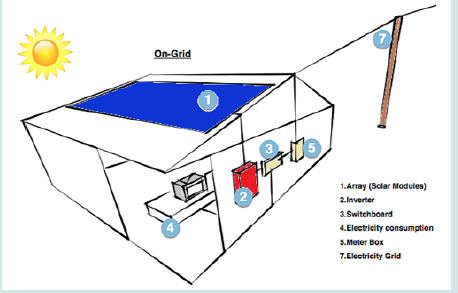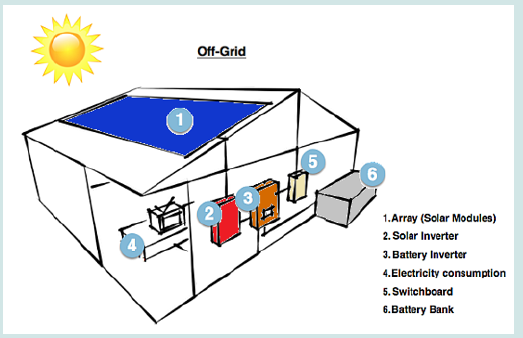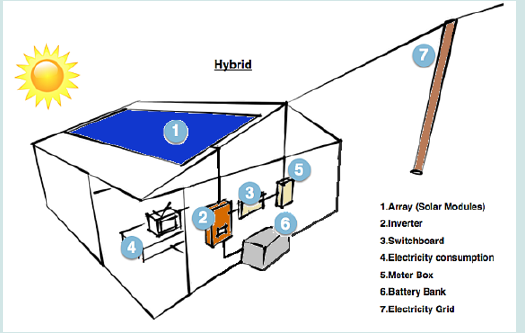
Lupine Publishers Group
Lupine Publishers
Menu
Research ArticleOpen Access 
Utilization of Solar Energy to Optimize Small Business Costs Volume 2 - Issue 4
Maia Melikidze1*, Gvantsa Tugulashvili2 and Garik Teymurazyan3
- 1Associate professor at BTU, Founder of RES LAB (Renewable Energy Sources Laboratory), Georgia
- 2Researcher, RES LAB, Business and Technology University, Georgia
- 3Researcher, RES LAB, Business and Technology University, Georgia
Received:February 20, 2024; Published: February 26, 2024
Corresponding author: Maia Melikidze, Associate professor at BTU, Founder of RES LAB (Renewable Energy Sources Laboratory), Georgia
DOI: 10.32474/JBRS.2024.02.000146
Abstract
Recent technological innovations and reductions in production costs have facilitated the development and adoption of solar energy technologies. Systems converting solar energy into electricity are considered unique technologies for producing one’s electricity. This paper discusses the benefits of solar energy utilization for the business sector. Within the scope of the work qualitative research has been conducted. The main part is the in-depth interviews, with which we can see the current situation in terms of renewable energies. As a result of the research, it was determined that the involvement of businesses in terms of renewable energies is increasing year by year, although this field is still not sufficiently developed in Georgia. for bacterial detection in seawater, capable of monitoring coastal sites with results comparative to the gold standard method.
Keywords: biosensor; E. coli; E. faecalis; automated system; LAMP
Introduction
The term “Renewable Energy” become more actual in recent years. This is a source that can be used not once and is inexhaustible in contrast with fossil fuels. Among renewables one of the most popular is sun energy. Recent technological innovations and the reduction of costs have facilitated the development and implementation of sun energy. Worldwide have been building facilities working on sun energy as it is ecological and supports CO emissions reduction.
Nowadays, harnessing solar energy is no longer a problem in Georgia. Along with technological development, the source become a more efficient solution for consumers and businesses. Despite rising awareness during recent years, the utilization of solar energy is not in the active phase from the small business side. The purpose of the research is to determine in what way it is possible to implement modern technologies in the utilization of solar energy and what benefits it brings to small businesses to utilize the mentioned field.
Results and Analysis
The perspectives of using solar energy and technologies
Due to its geographical location, efficient, long-lasting and powerful solar radiation is high in Georgia, therefore, the country has the best opportunities and potential to develop solar resources, convert them into energy, and use them effectively. During the year in most regions, there are 250-280 sunny days, which means more than 6000 sunny hours. The presented map of Georgia shows that solar radiation is high in the regions of Georgia. Accordingly, the mentioned resource is maximally usable and can be used wisely, since the country has full readiness for this (Illustration 1).
Illustration 1. The level of solar radiation in Georgia, 1999- 2018.
Source: World Bank Group
With the development of modern technologies, it is now possible to efficiently absorb and use solar energy. There are two main types of solar energy technologies - photovoltaic (PV), or solar panels, which is a method of generating electricity using solar cells to convert solar energy through the photovoltaic effect, and concentrated solar-thermal power (CSP), which uses the sun’s heat. Both types of technology are available in the market. The generated electricity can be used for household, industrial or other personal purposes. Also, it is possible to store the accumulated energy in batteries.
In the PVs, When the sun shines on a solar panel, the energy from the sun’s radiation is absorbed by the panel’s PV cells. The given energy creates electrical charges that move through the cell in response to the internal electric field, a process that causes electricity to flow. As for CSP, the system uses mirrors to reflect and focus sunlight onto receivers that collect solar energy and convert it into heat that can be used to generate electricity or for further use. [2] There are three main types of solar energy systems, the main component of which is the panel, as it is the source of generation.
On-grid is grid-connected solar systems, which are the most common and widely used in homes and businesses. These systems do not need batteries, it is connected to the network. In this case, it is important to engage in a net metering program, that is, to install a special meter through which any excess solar energy generated by the panel is exported to the electricity grid [6].
Illustration 2. On-Grid system scheme
Source: Clean Energy Reviews
An off-grid system is not connected to the electricity grid and therefore requires a battery to store excess energy. Off-grid solar systems must be designed to generate enough energy year-round and have enough battery capacity to meet electricity needs, even in winter, when there is usually much less sunlight [6].
Illustration 3. Off-Grid system scheme
Source: Clean Energy Reviews
A Hybrid System is a modern system that allows the user of electricity to be included in the system, as well as to place the battery and in case of disconnection from the network, automatically switch to the electricity stored in the battery. This system is most effective for facilities such as, for example, medical facilities, homes in mountainous regions, or other facilities where electricity often goes out or is not available at all [6].
Illustration 4. Hybrid system scheme
Source: Clean Energy Reviews
Cost optimization for small businesses
Solar energy is one of the most reliable sources of natural energy that can benefit small businesses. Although it depends on its location and the amount of sunlight, it is still an excellent, green energy source. Solar power is most effective in the summer when the days are longer and more sun is available to generate electricity. However, that doesn’t mean you can’t benefit from solar energy during the winter months. Electricity is generated from solar, wind and hydro energy. However, depending on financial availability and technical characteristics, citizens largely choose solar panels. The prices of solar panels have been decreasing in the last period; therefore, the implementation of solar technologies is becoming more affordable for the user. Installation of solar panels in Georgia with the On-Grid system costs approximately 450-550 dollars per kilowatt.
One of the most important factors for small businesses is utility costs, which are a constant cost to the company. Installing solar panels through modern technologies is one of the most effective ways to reduce these costs. Return on investment (ROI) is important to consider before a company installs solar panels. To calculate a company’s ROI, the starting point is to sum up how much it pays for electricity now. To accurately estimate ROI, a company can calculate a 12-month history of energy consumption [3] The payback period for photovoltaic solar panels varies depending on several factors, including the scale of the installation, local climate and energy consumption. With a variety of financing options and government incentives, solar installations have a payback period of three to five years. Because PV solar cells have an average lifespan of 25 to 30 years, the financial benefits of solar panels outweigh the investment [7].
Dependence on the grid also means exposing business costs to fluctuating electricity rates. A sudden increase in prices can cause a large cash flow outflow from the company. Reducing dependence on electricity from the grid will significantly reduce utility costs. Commercial property owners typically reduce their overall energy costs by 75% by installing solar panels [7].
Government Incentives and Net-Metering
To encourage the production and use of energy from renewable sources in Georgia, a net-metering system has been implemented, which is one of the first tools for encouragement. Micropower power plant regulation - net-metering refers to the process of the flow of electricity generated from micropower power plants into the network and the mutual accounting of the electricity received from the network, during which the produced and consumed electricity offset each other. Net metering can be used by any individual and legal entity that owns a solar, wind, hydro and/or other renewable energy micropower plant, the capacity of which does not exceed 500 kilowatts.
Research Methodology and Interpretation
A total of 4 respondents participated in the in-depth interviews conducted within the qualitative research.
As a result of the research, it was determined that solar power plants are being actively developed in Georgia. Several companies are operating in this field on the market that successfully provide services from consulting to networking to legal entities and individuals. Since the research includes small businesses that have utilized solar energy with modern technologies, it was first determined who can be granted the status of a small business. In the law of Georgia, according to the Tax Code of Georgia, the status of a small business can be granted to an entrepreneurial individual, whose total income from economic activities during a calendar year does not exceed 100,000 GEL [4].
In terms of utilization of renewable energies, and how far Georgia is developed, the general opinion of the respondents was that the mentioned field is less utilized in Georgia. However, according to them, the utilization of solar energy increased over the years. With the development of technologies, it is possible to offer many innovative novelties. The research found that there are almost no factors for small businesses that could negatively impact the company after going solar. Respondents talked about almost all the positive factors discussed in the paper and all unanimously agreed that the adoption of solar technologies will allow businesses to optimize costs. When asked what period the company needs to recover investment money after implementing solar technologies, the payback period for large companies is 5-6 years, but they also note that despite the low demand from small businesses, the company’s costs are still reduced. In this case, the payback period is slightly longer, since the withdrawal of the invested investment depends on the size of the station and the power received from it.
If we consider incentive systems from the side of the state, the respondents generally have a positive attitude towards this issue. According to them, the measures conducted by the Georgian National Water and Energy Regulatory Commission are of great importance, since increasing the capacity in net metering to 500 kilowatts has caused more interest of companies. Solar panel installation companies point out that for any business, solar utilization optimizes the company’s costs. According to their assessment, the demand for utilization of solar panels is increasing year by year, which is hopeful progress in this direction.
Conclusion
The development of modern technologies is directly related to the increased consumption of electricity. Over time, it becomes necessary to switch to an alternative, inexhaustible source of energy. The development of technologies allows efficient utilization of solar energy, which is a sign of the financial well-being of various business sectors in the country. Georgia has the greatest potential for the utilization of renewable energy and the development of the business sector in this regard, both with the wealth of free territories and solar power. Development of small businesses in terms of energy will help the country to become energy independent, reduce the share of imports and most importantly improve environmental conditions.
According to the study, the increase in demand for solar technology implementation from large businesses and households is greater than from small businesses. This is because large businesses require more electricity, which is associated with high utility costs, so investing in the installation of solar panels is not worth it in the long run. As for households, since a small amount of electricity is needed for personal consumption, installing solar technologies is relatively cheap. Moreover, small businesses often do not have enough resources to install solar power plants without financial support from the government or international institutions. In addition to raising awareness for small businesses, it is a necessary condition for the state to carry out various supporting measures. Based on the conducted research, it can be said that those subjects for whom the involvement of the state is of great importance have a positive attitude towards the conducted and ongoing events. From their side, the implementation of the net accounting system and making changes to it, which means increasing the capacity to 500 kilowatts and other positive factors included in it, deserve a lot of attention.
References
- Ahlgren Ode K, J Lagerstedt Wadin (2019) Business Model translation-The Case of Spreading a Business Model for Solar Energy. Renewable Energy 133: 23-31.
- (2023) How Does Solar Work? Energy Efficiency & Renewable Energy.
- Hou Amy (2019) How to Maximize Your Solar Investment and Track ROI.
- (2010) Law of Georgia on the Tax Code of Georgia.
- Newkirk Martin (2016) How Solar Power Works- On-Grid, Off-Grid and Hybrid Systems.
- Russell Connor (2022) The unexpected benefits of using solar power at your small business.
- Wang HKH (2020) Renewable Energy Management in emerging economies: Strategies for growth. Routledge.

Top Editors
-

Mark E Smith
Bio chemistry
University of Texas Medical Branch, USA -

Lawrence A Presley
Department of Criminal Justice
Liberty University, USA -

Thomas W Miller
Department of Psychiatry
University of Kentucky, USA -

Gjumrakch Aliev
Department of Medicine
Gally International Biomedical Research & Consulting LLC, USA -

Christopher Bryant
Department of Urbanisation and Agricultural
Montreal university, USA -

Robert William Frare
Oral & Maxillofacial Pathology
New York University, USA -

Rudolph Modesto Navari
Gastroenterology and Hepatology
University of Alabama, UK -

Andrew Hague
Department of Medicine
Universities of Bradford, UK -

George Gregory Buttigieg
Maltese College of Obstetrics and Gynaecology, Europe -

Chen-Hsiung Yeh
Oncology
Circulogene Theranostics, England -
.png)
Emilio Bucio-Carrillo
Radiation Chemistry
National University of Mexico, USA -
.jpg)
Casey J Grenier
Analytical Chemistry
Wentworth Institute of Technology, USA -
Hany Atalah
Minimally Invasive Surgery
Mercer University school of Medicine, USA -

Abu-Hussein Muhamad
Pediatric Dentistry
University of Athens , Greece

The annual scholar awards from Lupine Publishers honor a selected number Read More...







